A reasoned response to internet bile…
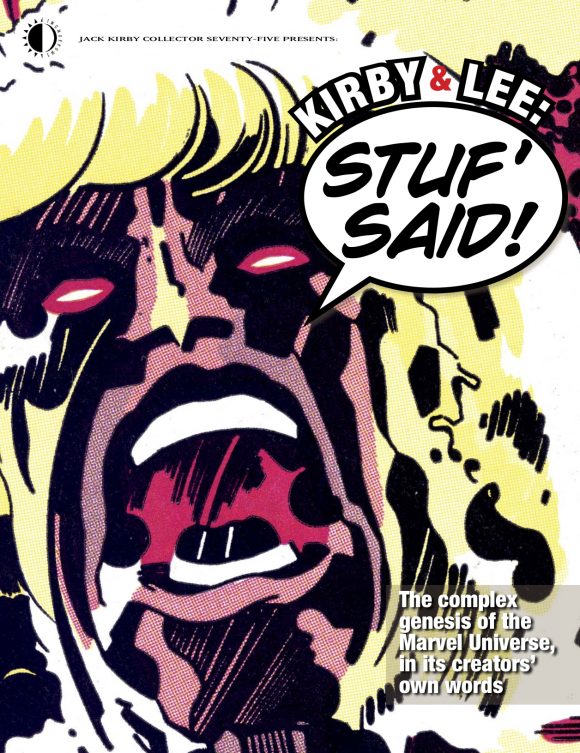
Back in January, we ran an EXCLUSIVE EXCERPT from John Morrow’s Kirby & Lee: Stuf’ Said, an exhaustively researched exploration of just who deserves credit for what in the Marvel Universe – whether it was Stan Lee, Jack Kirby, Steve Ditko, other creators or some combination thereof. (Click here to check it out. You’ll want to.)
As you might imagine, reaction to the 176-page book – which doubles as The Jack Kirby Collector #75 — was powerful, and not always in a good way.
So, Morrow has decided to address the fallout in his opening column of The Jack Kirby Collector #76, due out May 22. Given our role in getting that excerpt out there, we’re presenting it here in full, right after we present the issue’s table of contents so you can see what else the ish has to offer:
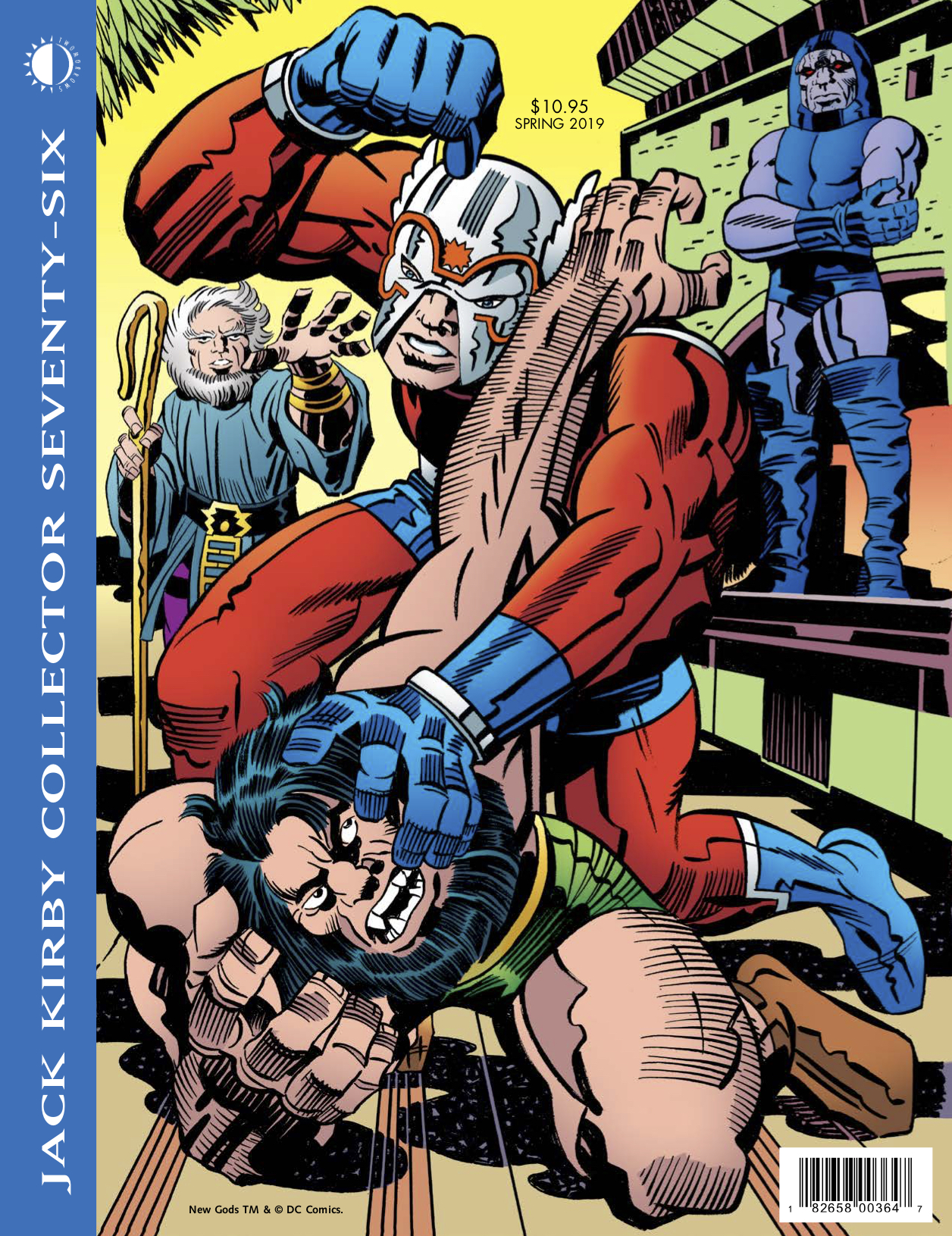
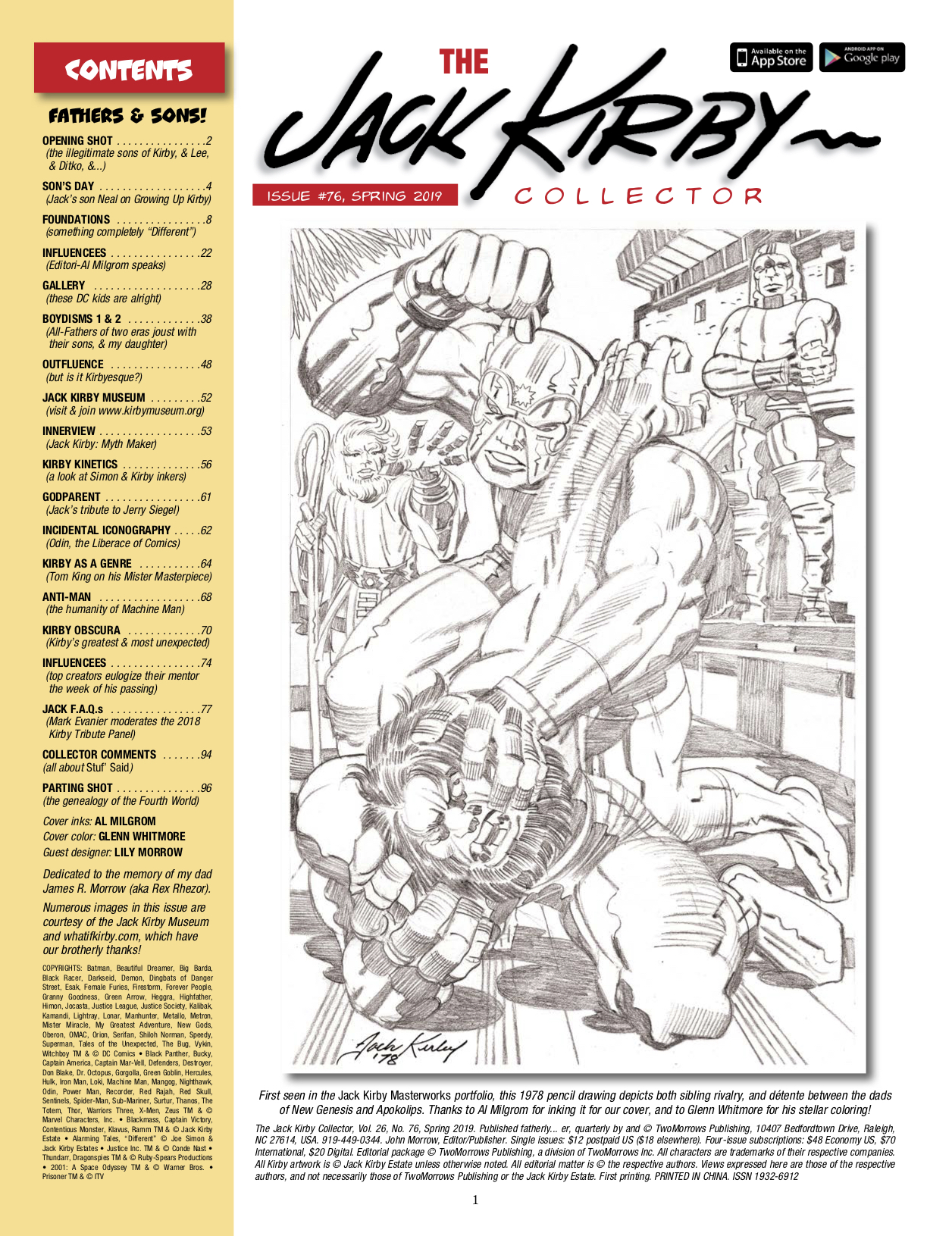
—
By JOHN MORROW
In the early 1960s, during the dawning days of comics fandom, there was an informal group called the Illegitimate Sons of Superman, of which future comics pros Marv Wolfman, Len Wein, Mark Hanerfeld, and others were members. There was no internet back then, so these guys shared their opinions in person, and through mimeographed fanzines they’d produce for a much smaller audience than this magazine reaches each issue.
It’s a very different world now, and thanks largely to today’s technology, last issue’s Stuf’ Said book edition elicited tremendous response from comics fans, as I’d hoped. Online, I’ve seen comments from all across the spectrum of fandom. It’s been overwhelmingly positive, and you can read just a few of the responses in this issue’s letter column.
But while I try to keep as positive a tone as possible with this publication, I’m about to delve into the dark side (Darkseid?) of Kirby fandom.

With internet discussion comes inevitable controversy. I hesitate to repeat some of what I’ve read in light of Stuf ’ Said, for fear of giving it credibility, but I think it needs to be addressed. Some
(I assume well-meaning) Kirby fans online are putting forth the notion that Stan Lee and his wife Joan cheated Kirby out of credit to support an extravagant lifestyle.
Another painted partner and friend Joe Simon as one of the most unscrupulous people to ever work in comics, who swindled Jack out of money and credit. Still another says Roy Thomas doesn’t have any value to a publication about Jack Kirby, because he’s nothing more than a mouthpiece for Stan.
The problems here are many, but the most glaring is: They present no real proof to these allegations, only limited quotes with no context, and often from third parties), innuendo, and deflections of “well, so-and-so over at this other web- site said… .” And when well-reasoned historians like Marvel’s own Tom Brevoort try to rationally and calmly dissect those accusations, these kneejerk reactionaries start up with more unsubstantiated claims.
We’re better than this, Kirbyheads.
This was not what I had in mind for Stuf ’ Said (or The Jack Kirby Collector in general), and it’s not what my book promotes or concludes.

I exhausted myself last issue, trying to present as clear a picture as possible of how the Kirby/Lee relationship evolved, from its earliest days to its end. I wanted readers to see what I saw; that you need to get a full view of events, not just a single moment in time, before you render a verdict.
There have been plenty of submissions I’ve rejected over the years for taking things too far, with a few people taking me and this magazine to task for not “going for the jugular” against Lee, and dismissing me as a wimp for staying as positive and pragmatic as I could. To those who think I’ve been too soft on Stan, I encourage you to go back and re-read Mike Gartland’s Failure To Communicate series, or Mike Breen’s article in TJKC #61 about the likelihood that Kirby dialogued Fantastic Four #6.
I’ve also gotten a fair amount of heat over the years for a perceived “anti-Stan Lee bias.” For any of you readers who think I’m anti-Lee, I’d only ask you to review all the articles I personally have written for TJKC and see what my view is and has always been.
Don’t judge me based on articles others have written. As editor, I have to decide as fairly as possible, what gets published and what gets rejected, and try to be as objective as I can, even when I
don’t agree with what’s written.
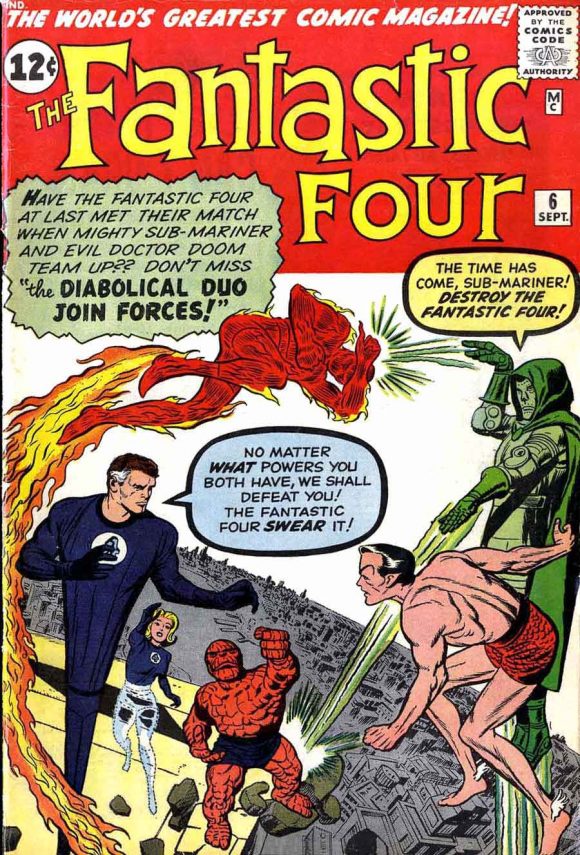
Sometimes you just can’t win; but I also have to accept that comes with the territory of producing a publication like this. Some fans get so blinded by their loyalties and prejudices, they can’t see that every pancake has two sides, even if you prefer the way one is cooked over the other.
I think all the good this magazine has done in promoting Kirby since 1994, at a time when Jack was receiving no creator credit and little public recognition, has proven my approach is the correct one. By trying to give a forum to fans on all sides of the Kirby/Lee spectrum, I’m confident I’ve contributed to the greater good these last 25 years, rather than burning bridges for the sake of someone’s short-term visceral gratification.
But that must be done professionally, and without taking personal shots at those no longer around to defend themselves.
I once was a bit of that kind of reactionary, back in the late 1980s, during Kirby’s battle to get his original art back from Marvel. When I read that Stan wouldn’t step in to help, I was so disillusioned, that I destroyed the autograph I’d gotten from Lee back at the 1977 Atlanta Fantasy Fair where he was the guest of honor. I was naive and uninformed about what challenges Stan would’ve faced by getting involved at that point; and whether it was craven for him to make that choice, or shrewd, I’m now at a more mature point in my understanding of the details of that conflict. Much like my view of Vinnie Colletta’s inking shortcuts, I’ve evolved to have a clearer picture of what Lee was facing, whether or not I would’ve made the same decisions he did.
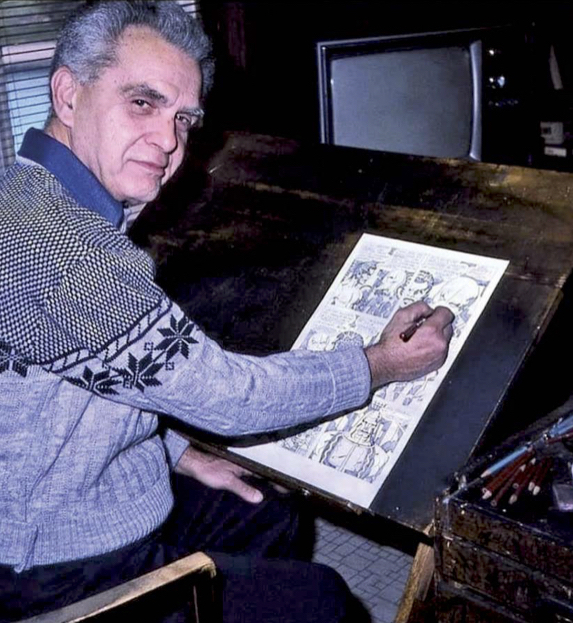
Kirby
In a sense, we are all illegitimate sons of Jack Kirby — and of Stan Lee, and Steve Ditko, for that matter. We obviously don’t share a common mother, and through no real choice of our own, fell backwards into our appreciation of their work. We read it, and it just happened.
As this magazine has progressed, I’ve evolved in my views. Growth is part of life, and just as a plant will wither and die if it fails to absorb the water and nutrients around it, so will people if they refuse to soak up the knowledge and insight that surrounds them. It’s what’s wrong with the political discourse in our country right now, as people are so entrenched in “their side” (and afraid of “losing”), that they won’t take a minute to try to understand where the other person is coming from.
There are moments where you have to take a stand for what’s right, and I’ve always tried to do so. But there are other moments where it’s prudent to step back, take a deep breath, and make doubly sure you’re doing what’s right before you act — or more accurately, react.
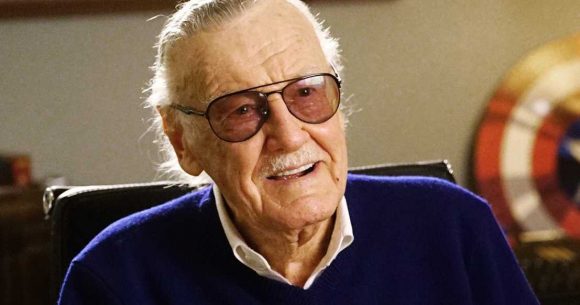
Lee
To be clear: I love Kirby fans’ enthusiasm and respect for Jack and his work, just as I appreciate Lee’s devotees for theirs. But I can keep learning from both sides, and so can you. And we can maturely discuss the success and failures of both Jack Kirby and Stan Lee here, both creatively and personally, as long as it’s done in a respectful manner.
So, if you want to take potshots at either man’s friends or family, look somewhere else, because this ain’t that type of publication.
—
The Jack Kirby Collector #76 is due May 22. You can get it at your local comics shop or directly through TwoMorrows. Click here.
—
MORE
— LEE, KIRBY and the Case of Who Created the Marvel Universe. Click here.
— THE KING 101: Comics Pros Pay Tribute to JACK KIRBY. Click here.
— A VISIONARY: Comics Pros Pay Tribute to STAN LEE. Click here.

May 21, 2019
The problem is not that Jack was an incredible artist; the problem is, a lot of people credit him with everything. Jack’s dialogue on his DC and later Marvel projects were painful to read. His concepts were brilliant. But i could not stand his dialogue, and the free rein he was given to throw anything out there and expect it to be as good as his collaboration with Stan.
May 21, 2019
In other words, he had great ideas which made their way into his artwork, but he needed a writer like Stan Lee to better express those ideas in words.
May 21, 2019
Annonimous trolls are all the rage on the internet. “Not” acting like adults is the norm. Its on every site about every subject matter. We didn’t have the internet growing up. And didn’t need it. Information was gathered by reading, discussing and studying. Conclusions ( not opinions) were made by the gathering of that information. And no one spat on anyone else in the end. Its comics. Nothing more. Stan is the man. Kirby rules. Grow up.
May 21, 2019
There was a reason Kirby was the editor of his own books when he went to DC. He may have benefited from an editor and then again he may not have.
Try rereading the Kirby books again with the distance of time and see if they are better or worse than remembered.
May 28, 2019
When Kirby gets the rewards and praise that Stan Lee got, then I’ll worry about fans going too far in praising Kirby. ‘Nuff Said? I do agree that John’s evenhanded approach is the best way to go, though. And, as far as Kirby needing Lee’s writing help, I have the feeling that Kirby, during their collaboration, certainly helped Lee out quite a bit. What a radical idea, I know.:-)
May 21, 2019
Jack: ” Can I have my art back?”
Stan: “Nope, I cant make money off of it if I give it back”
It’s not hard to figure out who the villain is here.
May 22, 2019
That is utter nonsense, you need to learn how the publishing business works.
Stan did not make money from Kirby’s original art nor did he own the company Marvel Comics Group to make such an absurd statement (in fact, by 1980 Stan was not even at Marvel Comics anymore), it was corporation-run.
Besides Marvel’s reproduction dept. (headed by Stu Schwartzberg) had photostats shot of every page of art they ever published.
All the artists had to do was acknowledge and sign a Work-For-Hire voucher which Jack initially refused to do.
May 23, 2019
Stan was previously the president and he was getting paid over 100,000 dollars a year just have Stan Lee Presents on every comic book Marvel published. His relationship was different than most others who worked for the company. Second Kirby’s terms were much stricter in his Work for Hire voucher than other artists. He is making hundreds of thousands of dollars on a reputation that rested on Jack’s ideas.
May 21, 2019
First off John, I have enjoyed Nuff Said about as much as any book on the history of comics I have ever read. It was brilliantly laid out and a convoluted subject was made accessible and entertaining.
Much has been said about the Kirby/Ditko/Lee work dynamic for decades and your book was downright clinical in its assumptions, basing the entire premise off of the player’s own words. For me, it solidified what I always felt about the share of credit that should be doled out to each man.
Yes, Stan was a carnival barker who was touting the greatest collection of heroes ever assembled, and taking a bit more than his fair share of credit for the creativity behind the scenes. But I give Stan a pass to a certain degree because if it weren’t for his “hucksterism” and his ability to make the readers feel like they were a part of something special, the whole thing would not have taken flight. So, while I don’t give him all the credit he’d probably like regarding the actual stories and character creations, I do give him co-creator status in the sense that it never would have worked if he hadn’t been in the kitchen.
May 22, 2019
John, how DARE you be a voice of reason. I’m truly amazed at the behavior of adults here. Other than simply knowing the truth, no one has any dogs in these fights. Humans are truly odd.
May 22, 2019
The remarkable thing about the truly remarkable STUF’ SAID, is that sort of like the Bible, you can find a quote to back up almost any point you want to make.
Stan Lee, for example, routinely gave credit to Jack and Steve from the beginning, saying they often wrote the stories themselves with little input. But a few pages (or years), later Stan is saying he came up with the ideas and the artists simply drew them. As for Jack, he is maddeningly passive at key moments, but then simmers in anger — Stan merely ‘wrote the balloons.’
It can be a frustrating exercise, but one which STUF’ SAID lays out carefully, letting the words speak for themselves.
The truth is obviously in between, and the frayed relationship between the two men — Jack looking for a way out, Stan looking for a way to avoid a fight — resulted in the cracked glass that Marvel’s history has become. I for one resist the notion that Stan Lee was simply riding Jack’s talent, or the notion that Kirby merely did Stan’s bidding. Far from it.
What bothers me is the intensity and ugliness of the debate, whether about GAME OF THRONES.Luke Skywalker or Stan and Jack. The creative process, like life, is not all or nothing, and the over the top fan behavior described above is exactly the problem. Kudos to John Morrow for his book and this essay.
May 23, 2019
This column is relief to me and a gift. Relief from angry uninformed spite and rants. Gift of a fellow fan, seasoned and thoughtful, still enthusiastic over the magic Kirby (and Lee, and Ditko) gave us in comics.
I bought comics for $0.25 for a little rememwhile. I remember Stan’s writing a letter to us fans explaining the increase to $0.35. As is said above, Stan invited us to be part of something.
Man O Man, Jack Kirby made that Something Something Big!
May 23, 2019
Why is there such silly rhetoric which comes from “Marvel Zombies” in the sense that Time seems to have started just with FF #1 plus a few “pre-hero” monster books. At least that is what it seems like at times reading commentary on out the net.
Ummm, Jack with Joe had a long distinguished career dating 1942-1955 with 50-50 royalty concepts in the contract.
Donenfeld welcomed S&K with open arms.
They did not “defect” from Goodman’s Timely Comics gig.
They had been promised a royalty on sales. Goodman lied.
Lee backed what ever his boss who signed his pay check told him to do.
This should be clearly delineated in the 2nd Revised edition.
“Defect” used on page 10 has other connotations which are not real.
S&K were the first team advertised inside those two staple comic books as the ONLY reason one needed to buy that comic book. This began in 1942 National Periodical Superman-DC publications.
All their deals with Harvey, Crestwood, etc were also tied in to royalty concepts. This is what my research has informed me.
Even went in to self-publishing the S&K studio in 1954.
Goodman promised royalty concepts to Kirby, Ditko.
That is why Ditko left in 65 per a phone call we made to him in 1969.
Ditko flat out said he was promised royalty on AmSpi “…by the publisher…”
That is why Kirby almost left the same time.
This is what both Jack and Roz both said to me in 1977 during SDCC.
Roz and my wife had become friends waiting for their men to get done doing comic books. They were going out to dinner. We could tag along if we chose to. Roz drove. After dinner and a night of good talk, Roz asked me if I wanted to buy 200 (out of 600) original pages out of the trunk of their car for 20 a page. I had my choice picking from the 600. Roz made me promise not to sell any pages for less than 35 a page so as to maintain a basement ceiling value. I said to her that I would do as she said!
Am looking forward to the revised 2nd edition which hopefully fixes error of fact I see inside such a huge monumental research project many souls have spent a life time(s) sussing out this first published attempt a cosmic time line.
May 23, 2019
Whoops, I used my FB acct to log in. Seems to have blown up my profile pic covering my initial words. Bummer
May 25, 2019
Stan Lee may have been the public face of Marvel Comics, but he wasn’t the true villain of the story. Martin Goodman was the villain, or one of them. Him and his successors — the people he sold his company to in 1968, and the people who succeeded them, the people who were actually in charge of *running* the company (not Stan Lee, and not the editors who succeeded him at Marvel). THOSE were the people who actually withheld the royalties, credit and artwork due to Jack Kirby.
Maybe you can accuse Stan of not standing up and taking Kirby’s side, of not going to bat for his cause, but Stan had always been an *employee* of Marvel, not a freelancer like Kirby, and he was dependent on the company’s goodwill for a paycheck, even after he became a largely autonomous media promoter/agent and “publisher emeritus” in the 1980s. Where else was he going to go after 40 or 50 years working for the same company and being its public face? For Stan to go against the company, he would have had to sacrifice a lot personally. He couldn’t do it when he was working directly under Goodman, and he couldn’t do it later, either. I don’t think most of us could have committed that sort of professional suicide if we were in the same situation.
As for giving Stan credit for where its due, he may not have been the conceptualist that Kirby and Ditko were, but he was the public personality of both the characters (through his dialogue) and of Marvel itself as a company — at least as far as how the company and its characters were perceived by the readers. That counts for a lot, whether you call that an act of “creation” or not.
May 25, 2019
It’s worth pointing out that even Martin Goodman was on the receiving end of being screwed by the company he once owned. After he’d sold the company and retired, his expectation (probably through some verbal promise — nothing “legal” or “in writing”) was that the new owners would promote Goodman’s son Chip would succeed him as the new publisher of Marvel. He should have known enough to never trust in verbal promises — he’d reneged on enough of them himself when he was owner. Goodman was so miffed when the new owners of Marvel (wisely, it seems) promoted Stan Lee as the new publisher (a position he held for less than a decade, in the 1970s) that Goodman went out and created Atlas Comics (as opposed to Atlas Distribution, the company he had owned in the 1950s to self-distribute his own publications) with Chip Goodman as the publisher. Yeah, he decided he’d show THEM — he built a comic book company into a juggernaut once, and he could do it again! Eh… not quite.
February 19, 2020
I have only recently purchased Stuf’ Said, but marvel (punpartially intended?) at the exhaustive research that has gone into this publication, and I appreciate it. I also am a member of a Jack Kirby appreciation group on Facebook, though ‘appreciation’ is not always what goes on there. I have no doubt encountered some of the folks who have made the offensive and outlandish claims you have encountered, and find them to be absolutely despicable people. A couple appear to be art collectors of Mr. Kirby’s and I can only assume their gutter-dwelling is due to their hopes of reinventing him into a much more profitable artist by disparaging anyone else who may be involved with the characters he worked on.
The bottom line is that we will never know the entirety of the truth because there were too many voices contradicting the order and nature of the events. All parties, allegedly aggrieved or at fault, are also deceased making the matter moot. Lastly, there has been a legal settlement that ends for all time the matter, whether internet trolls wish to accept it or not.
What lies beyond debate is that Jack Kirby was an unrivaled artist and creator of worlds. That’s entirely where the focus should be.
January 28, 2024
It’s insane that ANY example of using documented proof that Lee has received credit for things he didn’t do constitutes “Stan bashing” and the immediate response is to bring up how much Kirby needed Lee. These things are not the point, and Stan Lee deserves credit- just for what he DID do, not what he didn’t. Morrow is compromised and rationalizes.
January 29, 2024
OK